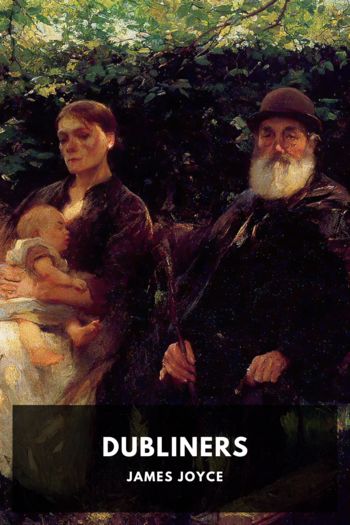Dubliners, James Joyce [black authors fiction .txt] 📗

- Author: James Joyce
Book online «Dubliners, James Joyce [black authors fiction .txt] 📗». Author James Joyce
He knew that Mary Jane must be near the end of her piece for she was playing again the opening melody with runs of scales after every bar and while he waited for the end the resentment died down in his heart. The piece ended with a trill of octaves in the treble and a final deep octave in the bass. Great applause greeted Mary Jane as, blushing and rolling up her music nervously, she escaped from the room. The most vigorous clapping came from the four young men in the doorway who had gone away to the refreshment-room at the beginning of the piece but had come back when the piano had stopped.
Lancers were arranged. Gabriel found himself partnered with Miss Ivors. She was a frank-mannered talkative young lady, with a freckled face and prominent brown eyes. She did not wear a low-cut bodice and the large brooch which was fixed in the front of her collar bore on it an Irish device and motto.
When they had taken their places she said abruptly:
“I have a crow to pluck with you.”
“With me?” said Gabriel.
She nodded her head gravely.
“What is it?” asked Gabriel, smiling at her solemn manner.
“Who is G. C.?” answered Miss Ivors, turning her eyes upon him.
Gabriel coloured and was about to knit his brows, as if he did not understand, when she said bluntly:
“O, innocent Amy! I have found out that you write for The Daily Express. Now, aren’t you ashamed of yourself?”
“Why should I be ashamed of myself?” asked Gabriel, blinking his eyes and trying to smile.
“Well, I’m ashamed of you,” said Miss Ivors frankly. “To say you’d write for a paper like that. I didn’t think you were a West Briton.”
A look of perplexity appeared on Gabriel’s face. It was true that he wrote a literary column every Wednesday in The Daily Express, for which he was paid fifteen shillings. But that did not make him a West Briton surely. The books he received for review were almost more welcome than the paltry cheque. He loved to feel the covers and turn over the pages of newly printed books. Nearly every day when his teaching in the college was ended he used to wander down the quays to the secondhand booksellers, to Hickey’s on Bachelor’s Walk, to Web’s or Massey’s on Aston’s Quay, or to O’Clohissey’s in the bystreet. He did not know how to meet her charge. He wanted to say that literature was above politics. But they were friends of many years’ standing and their careers had been parallel, first at the University and then as teachers: he could not risk a grandiose phrase with her. He continued blinking his eyes and trying to smile and murmured lamely that he saw nothing political in writing reviews of books.
When their turn to cross had come he was still perplexed and inattentive. Miss Ivors promptly took his hand in a warm grasp and said in a soft friendly tone:
“Of course, I was only joking. Come, we cross now.”
When they were together again she spoke of the University question and Gabriel felt more at ease. A friend of hers had shown her his review of Browning’s poems. That was how she had found out the secret: but she liked the review immensely. Then she said suddenly:
“O, Mr. Conroy, will you come for an excursion to the Aran Isles this summer? We’re going to stay there a whole month. It will be splendid out in the Atlantic. You ought to come. Mr. Clancy is coming, and Mr. Kilkelly and Kathleen Kearney. It would be splendid for Gretta too if she’d come. She’s from Connacht, isn’t she?”
“Her people are,” said Gabriel shortly.
“But you will come, won’t you?” said Miss Ivors, laying her warm hand eagerly on his arm.
“The fact is,” said Gabriel, “I have just arranged to go—”
“Go where?” asked Miss Ivors.
“Well, you know, every year I go for a cycling tour with some fellows and so—”
“But where?” asked Miss Ivors.
“Well, we usually go to France or Belgium or perhaps Germany,” said Gabriel awkwardly.
“And why do you go to France and Belgium,” said Miss Ivors, “instead of visiting your own land?”
“Well,” said Gabriel, “it’s partly to keep in touch with the languages and partly for a change.”
“And haven’t you your own language to keep in touch with—Irish?” asked Miss Ivors.
“Well,” said Gabriel, “if it comes to that, you know, Irish is not my language.”
Their neighbours had turned to listen to the cross-examination. Gabriel glanced right and left nervously and tried to keep his good humour under the ordeal which was making a blush invade his forehead.
“And haven’t you your own land to visit,” continued Miss Ivors, “that you know nothing of, your own people, and your own country?”
“O, to tell you the truth,” retorted Gabriel suddenly, “I’m sick of my own country, sick of it!”
“Why?” asked Miss Ivors.
Gabriel did not answer for his retort had heated him.
“Why?” repeated Miss Ivors.
They had to go visiting together and, as he had not answered her, Miss Ivors said warmly:
“Of course, you’ve no answer.”
Gabriel tried to cover his agitation by taking part in the dance with great energy. He avoided her eyes for he had seen a sour expression on her face. But when they met in the long chain he was surprised to feel his hand firmly pressed. She looked at him from





Comments (0)